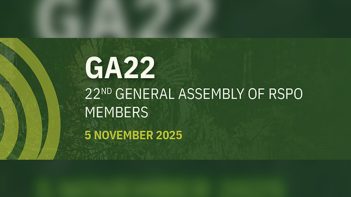As the world transitions to the post-pandemic period, the Assurance Standing Committee (ASC) carries on with its mission to provide strategic direction to ensure that the RSPO Assurance System remains credible despite the changing times. At the start of the year, the ASC welcomed Kamal Seth from WWF Singapore as its new Co-Chair, while William Siow (Malaysian Palm Oil Association – MPOA), Wan Kasim (MPOA) and Lawrence Quarshie (Golden Star Oil Palm Plantation) also joined the committee to replace outgoing representatives from the Malaysian Grower and Smallholder constituents, respectively. Throughout the first half of 2022, three meetings and one Assurance Forum were held. The following are key highlights of the activities.
Transforming Markets with Shared Responsibility
In its first quarter meeting in February 2022, the ASC was briefed on the RSPO Shared Responsibility (SR) framework. Applicable to ordinary, non-grower members, SR performance shall be reported via MyRSPO and the Annual Communication of Progress (ACOP). Following this, the Secretariat will conduct completeness and compliance checks while a third party will conduct an annual independent verification of a sampling of members before the data is published on the website. Public consultation for the first verification manual is currently ongoing until 29 July 2022.
The ASC also discussed the inclusion of Independent Smallholders in mills’ Principles & Criteria (P&C) certifications. Among the issues raised was the need to clearly define Independent Smallholders to avoid confusion with Scheme Smallholders and other terms in different National Interpretations and to determine the sampling mechanism. The Secretariat will work on updating the Certification System document, developing compliance guidance and providing a transition period to existing certificate holders with input from the ASC.
Conducting Audits in Force Majeure Situations
In May 2022, the Secretariat tabled the Contingency RSPO Audit Procedure for Supply Chain Standard (Version 2) draft. It was developed to provide a more comprehensive guideline to conduct audits for the Supply Chain Standard, following the announcement of the Contingency RSPO Audit Procedure in August 2020. The ASC gave its approval which was subject to the inclusion of a clarification on high risk situations. The final document was published on the RSPO website on 30 June 2022.
In the same meeting, the Secretariat reported the progress on the work plan from the Gap Analysis Report, which was endorsed by the ASC in July 2021. As of the first quarter of 2022, 19 out of 83 activities were completed while 46 activities are currently in progress. The Assurance Progress Report: Quarter 1 2022 was published on the RSPO website on 3 June 2022.
Another topic that the ASC deliberated on was the Secretariat’s initiative for land clearing monitoring within RSPO concession areas.The Geographic Information System (GIS) team under the Assurance Integrity Unit utilises Global Land Analysis and Discovery (GLAD) alerts to conduct analysis and request show cause from members. One of the matters raised was the need to improve the sanction mechanism for land clearings in uncertified units.
Strengthening Social Auditing
On 16 June 2022, the ASC and Complaints Panel (CP) convened to explore solutions on improving social auditing to ensure credible and reliable audit reports for RSPO processes. The members discussed their views on potential root causes such as audit time and cost constraints, lack of capacity among CBs, Assurance Services International (ASI)’s roles in monitoring the CBs’ performance, management systems (ISO-based) versus performance-based certification systems, the grievance mechanism in operating units and improving certification requirements to ensure local stakeholders and land rights holders are addressed in audits. Concrete recommendations from the meeting will be forwarded to the P&C Review Technical Committees.
With support from the ASC, the fifth Assurance Forum was conducted on 28 June 2022 with the theme of “Strengthening Audit Methodology Post-Pandemic”. Two discussion sessions were held during the forum; the first on “Enhancing Remote Audit” and the second on “Improving Auditing Skills to Increase Confidentiality and Confidence in Data”. A few common themes emerged from the discussions: utilising technology to build a specific platform and prevent data breach, as well as training auditors on specific skill sets such as adaptability to remote platforms, integrity and building trust. The input will be developed into a list of best practices and posted on the RSPO Interpretation Forum (RIF) and the website.
The ASC will continue to provide critical oversight to continuously enhance the RSPO Assurance System, backed by the dedication and expertise of its members.
To learn more about the ASC, click here.
Keep reading
Effective Date for Compliance: 2024 RSPO Principles and Criteria (P&C) and RSPO Independent Smallholder (ISH) Standard

NOTICE FOR THE 22ND GENERAL ASSEMBLY

RSPO Board of Governors Endorses Proposal to Form Executive Committee for Operational Oversight

Book Your Slot for the Additional prisma Clinic Session at RT2025

Advancing Jurisdictional Certification in Sabah: Strengthening Collaboration Between RSPO, UNDP, and Jurisdictional Approach System for Palm Oil (JASPO)
Call for Expression of Interest: Independent Investigation of a Complaint

Leading Labels: RSPO Among Top Sustainability Labels in Dutch Market

The 21st International Oil Palm Conference Successfully Took Place in Cartagena, Colombia





